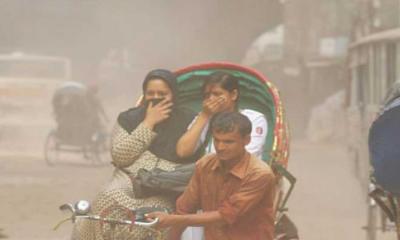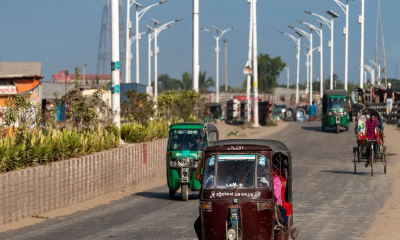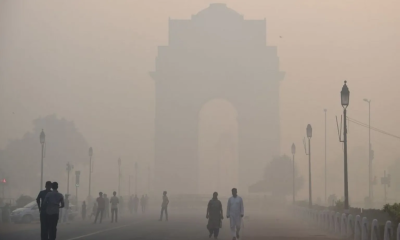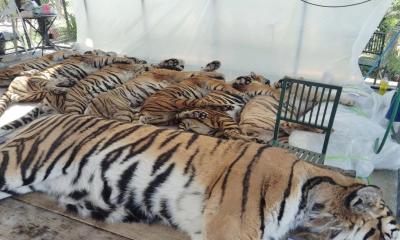Children in coastal areas are reportedly affected by various diseases caused by climate change impact. Such diseases are also increasing among children in urban areas as well.
Experts observed that the authorities must address the situation to build a healthy generation.
While visiting Mohammadpur Fertility Hospital in the capital city of Dhaka, the writer found some guardians standing with their sick children in queues. Some of these children have fever; some possess cold, and some have flatulence.
One such mother, Najma Khatun, came to see the physician of her 2-year-old baby girl, who was suffering from cold and was not taking breast milk.
When asked why so many children are getting sick this season, Dr. Mohiuddin, an on-duty pediatrician, said that most children suffer from physical problems due to overheating. Illnesses like itching, aversion to food, fever, and cold weaken children.
According to a United Nations Children's Fund (UNICEF) report, half of the world's 2.2 billion children are at grave risk due to climate change.1.7 million children die each year due to climate change. Because climate change seriously affects people's fundamental rights to health, food, water, clean air, education, and security. Therefore, increasing extreme weather around the world is putting a large number of children's lives at risk.
As a result of climate change, the pattern of different types of diseases is also changing, according to an eminent medical scientist and academician, Professor Dr. Liaquat Ali. He also said that climate change is causing warming, which is changing the patterns of pathogens. Weather is associated with the constant emergence of new viruses and bacteria. As a result, infectious diseases are gaining new heights. And children are easily affected by it.
Recent research by the World Bank has found new evidence of the adverse effects of climate change on health. Dengue outbreak in Dhaka had increased mainly due to climate change.
World Bank Country Director Marsa Tembone said that despite being one of the most vulnerable countries in the world, Bangladesh is significantly coping with the effects of climate change. However, owing to more robust evidence of the adverse impacts of climate change on physical and mental health, Bangladesh's health system needs to be strengthened to combat climate-related disease outbreaks.
Studies have shown that climate change is creating habitats for insects like mosquitoes. During the monsoon season, 24.5 diseases are caused by insects. In the dry season, this rate is 14.4 percent.
On the other hand, water-borne diseases are more common in the dry season than in monsoon. Respiratory infections are also common in the dry season. Researchers say increasing humidity and average temperature are associated with an increase in water-borne diseases. Dhaka and Chittagong have a higher prevalence of respiratory illnesses during the dry season than other parts of the country. And children are not spared from the outbreak of these insect diseases.
Mirza Shaukat Ali, Director, Climate Cell, Department of Environment, said, “The government prepared the Bangladesh National Adaptation Plan (NAP) in 2018 to assess the health risks that climate change will create and the consequences that will be felt in the coming decades.
He said that the government is working according to the National Adaptation Plan so that it is possible to adapt to the adverse effects of climate change.
As one of the victims of climate change, children bear the brunt of the adverse health effects of global warming.
Children's mental health is also affected.
Now come to the story of a ten years boy named Ravi, who was Studying in a private school in the capital in class three. Since the beginning of this year, he has been suffering ceaselessly. Currently, he is suffering from a cold and must constantly use an inhaler. However, Ravi's mother said that she is noticing changes in Ravi's mental health as well as physical ailments. Ravi doesn't want to play in the field like before. He doesn't talk to anyone like before, and Ravi gets irritable.
According to the World Economic Forum, climate change is affecting the mental health of children around the world. Disasters like fires, floods, fires. According to a recent International Panel on Climate Change (IPCC) assessment, its impacts are widespread, rapid, and intensifying. 15-20 percent of children who go through natural disasters suffer from various mental problems such as anxiety, depression, etc. Most of these children do not receive any treatment for recovering from such crises.
Researchers say that human development depends on a few years of childhood. If a natural disaster occurs during this time, it leaves an impression on the child's psyche. May cause fetal harm, with effects that may persist after birth.
Climate change has worsened the situation of coastal children. Therefore, children's physical problems on the city's picturesque coast are more acute. Due to salinity, various types of itchy diseases appear in children's bodies, almost children's bodies are swelling, and children often suffer from water-borne diseases due to lack of clean water.
In this regard, nutritionist Tamanna Chowdhury said that kidneys could not remove excess sodium from our bodies. As a result, extra salt sodium remains in the kidneys. It damages the kidneys. Overeating salt sometimes causes swollen hands and feet.
Excess salt is terrible for everyone. But it harms children more. It takes four months after birth for the baby's kidneys to function. So children should not overeat salt. This excess salt can accumulate in the body and cause kidney, liver, and muscle damage, and even death in children.
As per local claims, it is known that premature abortions often occur in this area.
Talking to the doctors of Shyamnagar Upazila Health Complex, they said babies are often born prematurely.
Speaking to Rahela Begum, who lives in Shyamnagar, she said that earlier I used to keep rainwater for children to drink, but this year as there is no rain, children have to drink salt water. And you have to go far for water; the area's children have to bear extreme hardships to fetch water.
Mizanur Rahman, the coordinator of Coast Trust ( a non-governmental (NGO) organization) working on the coast, said that due to the intrusion of salt water in these areas, there is a shortage of fresh water, agricultural production is decreasing, and animal husbandry is under threat due to lack of fodder, as a result of which children are suffering from various physical problems including malnutrition. To save from this situation, it is necessary to implement special projects nationally and internationally.
"Climate Fund money is not being spent with transparency," said Syeda Rizwana, chief executive of the Bangladesh Environmental Lawyers Association (BELA), intending to use the Climate Change Trust Fund to protect children and protect their physical and mental health. Many ministries and projects are receiving funds claiming that they work for climate, but the actual scenario is that the money is not going where it was supposed to be. He said the climate change trust fund should be used appropriately to protect future generations by increasing government monitoring.








-20251226051932.jpeg)
-20251222051606.jpeg)
-20260225072312.webp)











-20260224075258.webp)













-20260219054530.webp)
-20260218060047.jpeg)
